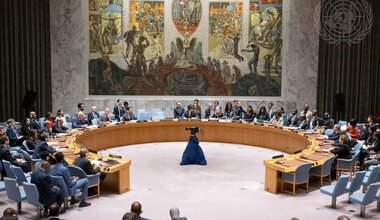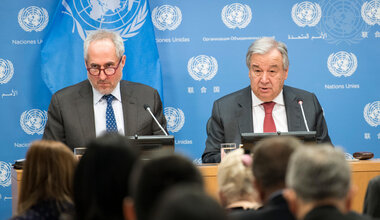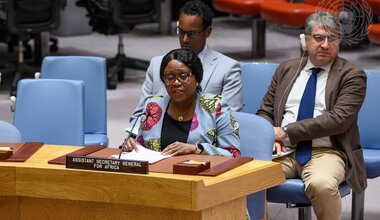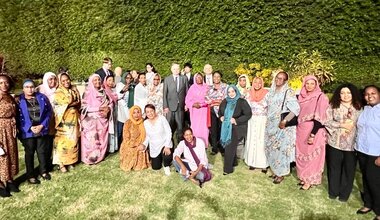Security Council Briefing on Sudan and South Sudan, Under-Secretary-General for Political and Peacebuilding Affairs Rosemary DiCarlo
Thank you, Mr. President, for the opportunity to brief the Security Council on the situation in Sudan and on the planning for our new mission in Sudan - UNITAMS.
Mister President,
When I addressed the Council on Sudan in April, I highlighted that COVID-19 was compounding the political, economic and security difficulties the country was facing. This broad assessment remains valid. Nonetheless, there have been positive developments in recent weeks. There have also been new challenges.
As the Secretary-General highlights in his report, Sudan’s political transition continues to move in the right direction. In recent weeks, important legislative reforms were adopted to improve fundamental rights. Interim civilian governors were appointed in all 18 states, including two women. These are very welcome developments.
The most significant political development, however, was the initialing, on 31 August in Juba, of the peace agreement between the transitional Government of Sudan, the Sudan Revolutionary Front (SRF) alliance and the Sudan Liberation Army (SLA-)-Minni Minnawi faction.
The parties agreed on a transitional period of 39 months, effective from the date of signing, which is scheduled for 3 October. Furthermore, Prime Minister Hamdok and the Abdelaziz al-Hilu faction of the Sudan People’s Liberation Movement-North (SPLM-N) signed “The Agreement on Principles” in Addis Ababa on 3 September.
All participating parties should be commended for having persevered with the peace process amid the range of other pressures brought on by the pandemic. Those who are absent from the ongoing peace efforts in the country should be encouraged to engage in dialogue and negotiations with the transitional authorities. It’s not too late.
As we embrace the recent progress in the peace process, we are also mindful of the significant work ahead. The various accords and respective peace agreements on regional issues must be molded into a single, coherent framework. Additionally, the parties and the Government must form a joint vision on the way forward and to uphold their respective commitments.
At a time when all governments face major economic constraints, it will be important to set realistic expectations of what can be provided to finance peace dividends. Participants in the Berlin Partnership Conference were generous in their support to Sudan’s transition but signaled that one impact of COVID-19 could be reduced donor capacity.
The United Nations, in partnership with the African Union, will offer support, as requested by the parties and within its capacity and mandate, to the implementation of these and future peace agreements.
Mister President,
On 10 September, the transitional Government of Sudan declared an economic state of emergency after a collapse in the Sudanese pound. This announcement followed months of soaring inflation, a spiraling exchange rate and continuing shortages of basic commodities.
Frustration with the state of the economy is growing, as evidenced by the re-emergence of protests across the country. Meanwhile, outstanding issues regarding economic management of the crisis leads at times to tensions between different components of the Government.
Despite these immense challenges, the Government has been able to make progress in undertaking difficult economic reforms. These changes, such as the removal of subsidies on fuel, form part of an agreement with the International Monetary Fund on a Staff Monitored Programme, one of the steps necessary to move Sudan closer to debt relief under the Heavily Indebted Poor Country (HIPC) initiative.
The financial assistance donors pledged at the Berlin Partnership Conference in June will help to offset some of the economic hardships Sudanese households are experiencing. The contributions will support the implementation of the World Bank-designed, but nationally led, social impact mitigation initiative, known as the “Family Support Programme”. The pilot for the initiative was launched with assistance from the World Food Programme this month.
I call on all donors to make good on their pledges and release funds into the Family Support Programme as soon as possible. I also call on international partners to address impediments that prevent Sudan’s full integration into the international economic community. In this regard, I am encouraged by the recent indications of progress on delisting Sudan from the United States State Sponsors of Terrorism list.
Mister President,
Since the start of the rainy season in July, Sudan has faced its worst flooding in decades, with over 800,000 people affected, of which more 100 perished. Between June and September, the projected number of food insecure people rose to 9.6 million, due in part to the impact of the COVID-19 pandemic, which has exacerbated ongoing inflation and price increases for food and other goods. Humanitarian organizations are working closely with the Government to respond, but further resources are required to meet the growing needs.
Mister President,
The planning for the establishment of the new United Nations mission in Sudan - UNITAMS - is progressing. Following the lifting of travel restrictions, the work of the planning team shifted in July from Headquarters to Sudan. I thank the Government of Sudan for providing high level of cooperation and support to the team.
The proposed structure and geographical deployment of the mission is outlined in the Secretary-General’s report. The design of the mission is intended to enable a new and innovative way of working, fostering maximum cooperation and integration among various UN entities.
The planning team of UNITAMS is working closely with UNAMID to maximize the impact of the two missions and ensure that lessons learned are shared and that UNAMID’s experience in Sudan is taking into account by the new Mission.
The mission start-up team for UNITAMS will deploy to Sudan next month to begin implementing the four strategic objectives mandated by the Security Council: assist the political transition; support peace processes; assist peacebuilding, civilian protection and rule of law; and support the mobilization of economic, development and humanitarian assistance. We will fulfill these objectives with full respect of the principles of national ownership and will work in partnership with the Government of Sudan and the Sudanese people.
Gender issues are mainstreamed throughout the mandate of the mission, which will have dedicated gender expertise, including at the senior level, to implement our commitments to advance gender equality and the women, peace and security agenda.
We know the significant role that women and civil society played in Sudan’s transition and their voices must be heard in shaping Sudan’s future. During a visit to Sudan last February I met with many representatives of women’s groups and of civil society, who are eager to play a constructive role.
Our planning team, including Special Advisor Haysom, have engaged both groups over the last few months as part of their efforts to design a mission that meets the needs of all Sudanese.
Regarding protection of civilians, we recognize the existing challenges. As requested by the Council, UNITAMS will support the transitional government in implementing its National Plan for Civilian Protection to establish a secure and stable environment in the conflict-affected areas. This will include contributing to the training and capacity building of the Sudanese police on protection of civilians. The mission will also work closely with the UN Country Team and civil society organizations on protection and monitoring.
Mister President,
We are conscious of the significant challenges before Sudan in fully realizing the objectives of its historic transition. The solutions to these long-standing difficulties remain with the Sudanese, and UNITAMS is being configured to accompany them in their efforts. We attach the highest priority to Sudan and to the speedy deployment of UNITAMS, including the appointment of a Special Representative. Mr. President, we look forward to working closely with the Security Council in this important endeavor. Thank you
 UN
UN





